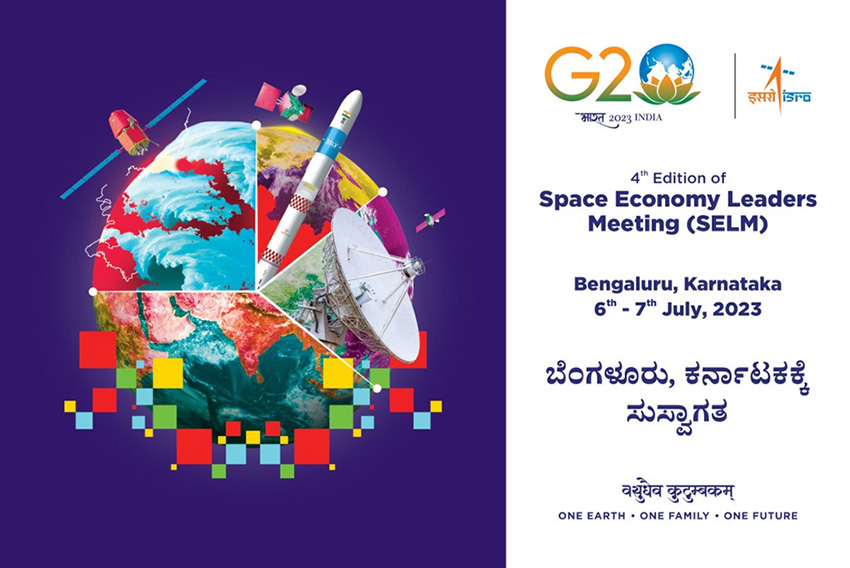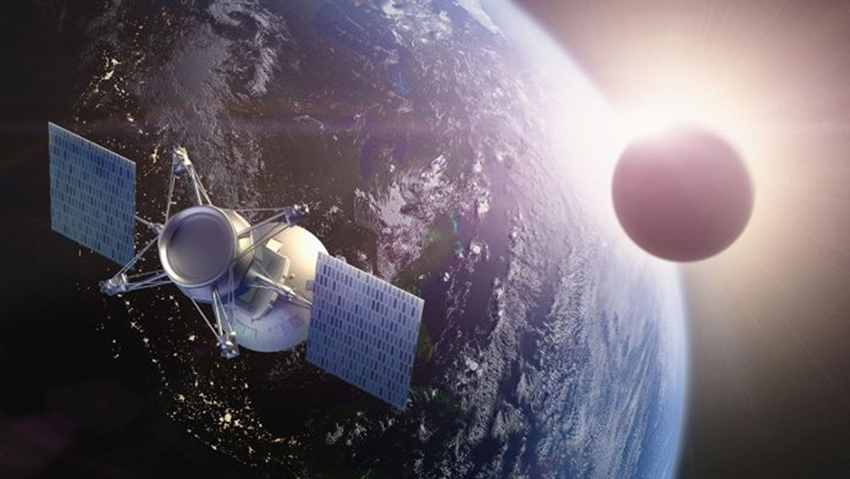G20 – 4th Space Economy Leaders Meet (SELM) Concludes on a high note
By R. Anil Kumar
Continuing the tradition of previous editions of Space Economy Leaders Meeting (SELM), by Saudi Space Commission (2020), Italian Space Agency (2021) and National Research and Innovation Agency, Indonesia (2022), Indian Space Research Organisation (ISRO), successfully organised the 4th SELM, under Indian G20 Presidency in two-phases, at Shillong and Bengaluru
Bangalore, July 8. Under India’s presidency of the Group of Twenty (G20), the 4th edition of the Space Economy Leaders Meeting (SELM) was held at Hotel Taj West End, Bengaluru during July 6-7, 2023.

Envisioning the enhancement of the Space economy, the G20 group conducted the Space Economy Leaders Meeting (SELM) for the first time in 2020. Since then, the meeting has been conducted every year on the sidelines of G20 meetings.
This year, under India’s presidency, Department of Space, in collaboration with the Indian Space Research Organisation (ISRO), NSIL, and IN-SPACe, organized the 4th edition of SELM.
The theme for this event, ‘Towards a New Space ERA (Economy, Responsibility, Alliance)”, was chosen in line with India’s G20 Summit’s theme of “One Earth, One Space and One Future” and the demand for an alliance of responsible space faring nations for an enhanced share of Space economy in the global economy while ensuring sustainability.
Towards a greater collaboration in the space sector
India’s presidency of the G20 can be a great opportunity for the G20 countries to collaborate on various sectors that use space technology, including agriculture, weather, cyber security, defence and connectivity.
There have been multiple occasions where India has collaborated with other countries for joint operations and space programs. One of the prime examples can be India’s Chandrayaan-1, which helped ISRO and NASA jointly discover water molecules on the moon’s surface.

Another example could be the Indo-French joint satellite mission called MEGHA-TROPIQUES, launched in 2011 with an aim to study the tropical atmosphere and climate-related aspects such as monsoons, cyclones, etc.
In addition, India has signed agreements with the USA, UK, Japan, and Bhutan to further enhance Space collaboration.
According to a joint report prepared by EY (Ernst and Young) and the Indian Space Association (ISpA), the Indian Space economy is expected to reach USDollar 13 Billion by 2025.
Realizing the huge potential of the sector and to play a greater role in the global space industry, Indian authorities have taken various measures in the same direction.
India’s Space sector undergoing massive reforms
In the last few years, India has undergone drastic reforms to boost its space sector and has witnessed tremendous progress in developing its indigenous space technology.
One successful example of India’s strength in the space sector is the Mars Orbiter Mission (MOM) which was appreciated worldwide.
The government’s recent step of opening up the space economy to private participation across all phases of activities has further accelerated investment inflow in the sector and can be further beneficial to attract Foreign Direct Investment (FDI).
The Heads of National Space Agencies, leaders of space industries of G20 and various Guest nations participated in the SELM event.
The summary of discussions is established under the responsibility of the Chair of the 4th Space Economy Leaders Meeting (SELM), with the purpose of reflecting key issues discussed during the 4th SELM, with the theme: Towards a New Space ERA (Economy, Responsibility & Alliance)
Economy
Recognizing the important role of the space economy within the global economy, the delegates discussed the potential to continue Space Economy Leaders Meeting in order to consider conducive policy regimes across the nations for enhanced space industry-level collaborations.
Responsibility
Recalling the reaffirmation at the second SELM (2021) to address the growing hazard of space debris and increasing congestion in Earth’s orbit, the delegates noted the benefit of preserving certain orbital regimes for safe human space flight activities for the benefit of all nations.
The delegates also noted the potential benefits of moving towards more sustainable manufacturing of space systems and progressive use of eco-friendly and green propulsion systems.
Alliance
Recognizing the increasing number and diversity of players in space, leaders stressed the importance of bilateral and multilateral partnerships involving the space agencies, industries and academia to address the challenges to the long-term sustainability of outer space. Leaders have also encouraged all space-faring nations to promote international cooperation and capacity building in support of the space-aspiring nations.
(A Report by R. Anil Kumar, IndiaStrategic, Bengaluru)





